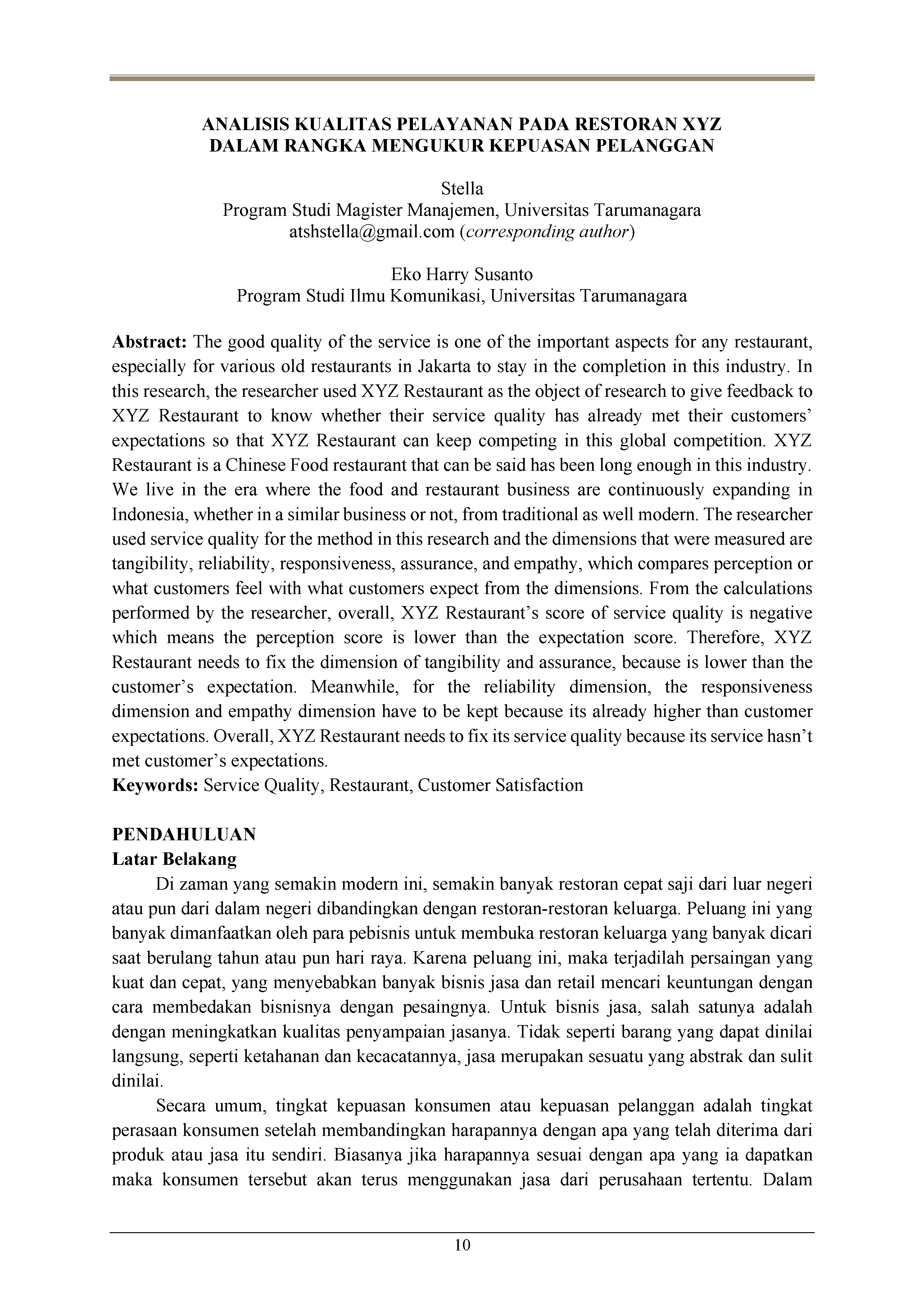Analisis kualitas pelayanan pada Restoran XYZ dalam rangka mengukur kepuasan pelanggan
Main Article Content
Abstract
The good quality of the service is one of the important aspects for any restaurant, especially for various old restaurants in Jakarta to stay in the completion in this industry. In this research, the researcher used XYZ Restaurant as the object of research to give feedback to XYZ Restaurant to know whether their service quality has already met their customers’ expectations so that XYZ Restaurant can keep competing in this global competition. XYZ Restaurant is a Chinese Food restaurant that can be said has been long enough in this industry. We live in the era where the food and restaurant business are continuously expanding in Indonesia, whether in a similar business or not, from traditional as well modern. The researcher used service quality for the method in this research and the dimensions that were measured are tangibility, reliability, responsiveness, assurance, and empathy, which compares perception or what customers feel with what customers expect from the dimensions. From the calculations performed by the researcher, overall, XYZ Restaurant’s score of service quality is negative which means the perception score is lower than the expectation score. Therefore, XYZ Restaurant needs to fix the dimension of tangibility and assurance, because is lower than the customer’s expectation. Meanwhile, for the reliability dimension, the responsiveness dimension and empathy dimension have to be kept because its already higher than customer expectations. Overall, XYZ Restaurant needs to fix its service quality because its service hasn’t met customer’s expectations.
Article Details

This work is licensed under a Creative Commons Attribution-NonCommercial-ShareAlike 4.0 International License.
This work is licensed under a Jurnal Manajemen Bisnis dan Kewirausahaan Creative Commons Attribution-ShareAlike 4.0 International License.
References
Jasfar, F. (2012). Teori dan aplikasi 9 kunci keberhasilan bisnis jasa: SDM, inovasi, dan kepuasan pelanggan. Salemba Empat.
Kotler, P. (2003). Marketing management (11th ed.). Prentice-Hall.
Kotler, P., & Armstrong, G. (2012). Principles of Marketing (14th ed.). Pearson Education.
Lupiyoadi, R. (2014). Manajemen pemasaran jasa: Berbasis kompetensi (3rd ed.). Salemba Empat.
Malhotra, N. K. (1993). Marketing research: An applied orientation (2nd ed.). Prentice-Hall.
Parasuraman, A., Zeithaml, V. A., & Berry, L. L. (1985). A conceptual model of service quality and its implications for future research. Journal of Marketing, 49(4), 41–50. https://doi.org/10.2307/1251430
Sugiyono. (2010). Statistik untuk penelitian. Alfabeta.
Sutriyanto, E. (2014, April 2). Dalam 5 tahun jumlah restoran kelas menengah tumbuh 250 persen. Tribunbisnis. https://www.tribunnews.com/bisnis/2014/04/02/dalam-5-tahun-jumlah-restoran-kelas-menengah-tumbuh-250-persen?page=2
Tjiptono, F. (2014). Pemasaran jasa: Prinsip, penerapan, dan penelitian. Andi.
Umar, H. (2003). Metode riset perilaku konsumen jasa. Ghalia Indonesia.
Zeithaml, V. A., & Bitner, M. J. (2003). Services marketing: Integrating customer focus across the firm (3rd ed.). McGraw-Hill.
Zeithaml, V. A., Parasuraman, A., & Berry, L. L. (1990). Delivering quality service: Balancing customer perceptions and expectations. Simon and Schuster.


